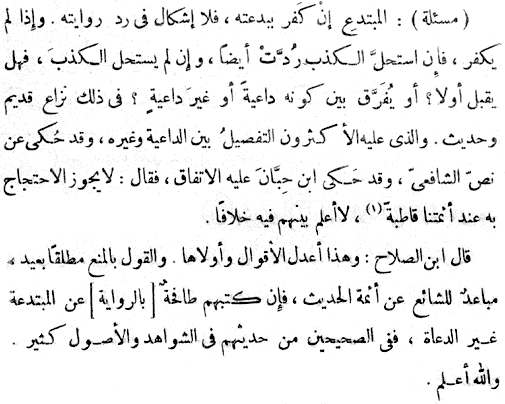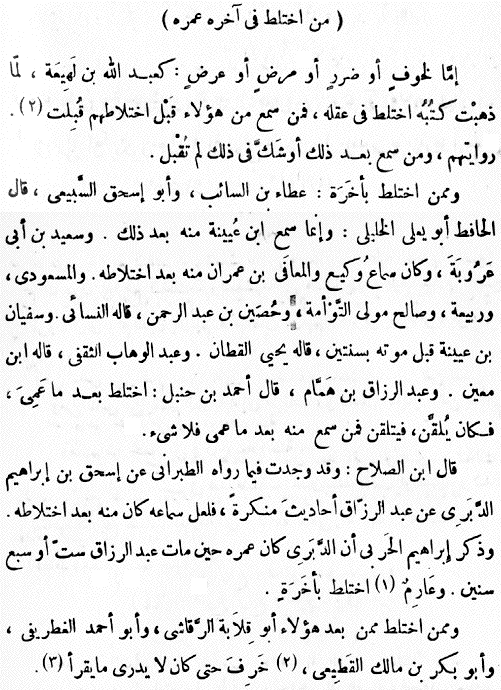![]()
Ḥadīths Inserted Posthumously In The Ṣaḥīḥ Of Al-Bukhārī?
Islamic Awareness
© Islamic Awareness, All Rights Reserved.
First Created: 5th August 2000
Last Modified: 7th September 2003
| Tweet |
|

|
Assalamu ʿalaykum wa rahamatullahi wa barakatuhu:
1. IntroductionWe are going to examine a number of strange claims made by Christian missionaries concerning the insertion of "many traditions" of "unreliable" narrators into the Ṣaḥīḥ of al-Bukhārī after his death. The claim is that the ḥadīths of "condemned" narrators were later inserted into al-Bukhārī's Ṣaḥīḥ:
It is interesting to note that Bukhārī wrote a book about the narrators (Zuafa-us-sagher). What is even more interesting is that Bukhārī's book condemns several narrators including: Ata bin abi Maimoona, Ayyub bin Aiz, Ismail bin Aban, Zubair bin Muhammad, At-Tayyimi, Saeed bin Urwa, Abdullah bin Abi Labeed, Abdul Malik bin Ameen, Abdul waris bin Saeed, Ata bin As-Saib bin Yazeed, and Khamsan bin Minhal as unreliable. However, the Hadith-collection of Bukhārī in the its modern form actually includes many traditions narrated by these very individuals! Obviously, these traditions, which Bukhārī rejected, were inserted in his book following his death.
This is an interesting charge, but where on earth is the evidence or source for this claim? The missionaries failed to provide any proper reference or quotation which the reader could verify. It seems that these claims can be traced back to the writings of one "brother Mark" who in turn quotes from book by Dr. Kamal Omar.[1] It can easily deduced reading his book that Kamal Omar is a rejecter of ḥadīth (i.e., belonging to the Qur'an-only sect). When the claim is made that the following narrators are unreliable:
Zuafa-us-sagheer condemns certain individuals like Ata bin abi Maimoona, Ayyub bin Aiz, Ismail bin Aban, Zubair bin Muhammad, At-Tayyimi, Saeed bin Urwa, Abdullah bin Abi Labeed, Abdul Malik bin Ameen, Abdul waris bin Saeed, Ata bin As-Saib bin Yazeed, and Khamsan bin Minhal as unreliable and hence rejected.[2]
one should at least quote from Kitāb al-Duʿafa al-Ṣaghīr of al-Bukhārī. For those who do not know what Kitāb al-Duʿafa al-Ṣaghīr is, it is a book written by al-Bukhārī about the narrators and their weaknesses whether minor or major. What is interesting is the Dr. Omar did not even quote Kitāb al-Duʿafa al-Ṣaghīr to support his position.[3] Christian missionaries do not fare any better either. This is sufficient enough to make any reader suspicious. Furthermore, commonsense would tell us that if someone was going to insert ḥadīth into al-Bukhārī's Ṣaḥīḥ after he died, why would that person(s) make the silly mistake of including condemned narrators in the chains of transmission of those ḥadīth, particularly condemned narrators from one of al-Bukhārī's other books? It would have made more sense to have ensured that all narrators were famous and reliable so that the ḥadīths would be accepted by the later day scholars without suspicion. How else is then the "insertion" would gain wide-scale acceptance from scholars of later times?
2. Are The Narrators Mentioned By Missionaries "Condemned" By Al-Bukhārī?The narrators mentioned by the missionaries are
Ata bin abi Maimoona, Ayyub bin Aiz, Ismail bin Aban, Zubair bin Muhammad, At-Tayyimi, Saeed bin Urwa, Abdullah bin Abi Labeed, Abdul Malik bin Ameen, Abdul waris bin Saeed, Ata bin As-Saib bin Yazeed, and Khamsan bin Minhal
It will be seen that most of the above mentioned narrators do not even exist in Kitāb al-Duʿafa al-Ṣaghīr! Whoever remains either belong to early sects of Islam, such as the qadariyyah, murji'ah, etc. It is interesting to note that al-Bukhārī did not condemn any of the above mentioned narrators as unreliable at all, contrary to the Christian missionaries' claim! Before we proceed with our refutation, let us digress breifly and define the methodology of our refutation.
3. The Methodology Of RefutationThe methodology of our refutation is the following:
Even though al-Bukhārī did include some of the above mentioned narrators in Kitāb al-Duʿafa he didn't specifically mention they are weak. For example, for the majority of other narrators in Kitāb al-Duʿafa, al-Bukhārī tells us why they were weak by using words like "he was rejected in ḥadīth" or "his ḥadīths are not authentic". For the narrators mentioned by Christian missionaries, al-Bukhārī does not say any such thing they were unreliable.
In most cases, the narrators mentioned by Christian missionaries were accused at one time or another of being associated with one of the early sects of Islam, such as the qadariyyah, murji'ah, etc. Al-Bukhārī mentions this in his Kitāb al-Duʿafa. This is, in our view, the reason why al-Bukhārī included these narrators in Kitāb al-Duʿafa; not because they were weak narrators, as we would soon see, but because they were linked to one of the rejected sects. This, however, does not stop us from accepting their ḥadīth so long as they do not openly make da'wah [i.e., to call] to their sect and also so long as the ḥadīth they narrate do not support the beliefs of their own sect. This is the soundest opinion among the scholars of hadith. Therefore, it was prudent that al-Bukhārī included these narrators in Kitāb al-Duʿafa to cover the eventuality that they narrated a ḥadīth supporting their sect.
Ibn Kathir in his book Al-Baʿith al-Ḥathīth Sharh Ikhtisạr ʿUlum al-Ḥadīth, deals with this issue succintly. He says:

Question: The one who commits a bidʿah [i.e., innovation in religion], if it makes him kafir, then there is no doubt that his narration is rejected. If it does not, then if he deems it lawful to lie, his narration is also rejected. If he does not make lying lawful, is his narration accepted or not? Does it make any difference if he preaches [his bidʿah] or not? There has always been a disagreement about that. The majority is for distinguishing preachers [daʿiyah] from non-preachers [of bidʿah]. This was narrated from al-Shafiʿi. Ibn Ḥibban narrated with agreement that: He cannot be used as an proof according to all our Imams, I don't know of any disagreement between them about that.
Ibn al-Ṣalah said: This is the most fair and best opinion. A complete prohibition is remote, far of the known opinion of the Imams of ḥadīth as their books are filled with narrations from people with bidʿahs who did not involve in preaching. The two ṣaḥīḥs contain many such ḥadīths regarding shawahid and uṣul [fundamentals]. And Allah knows best.[4]
It is clear from reading the above material, the best and fair opinion among the ḥadīth scholars is that as long as innovators did not openly make da'wah to their sect and the ḥadīth they narrate do not support the beliefs of their own sect, their ḥadīth is acceptable.
5. Narrators Who Got Confused In The Last Days Of Their LifeWhat about the narrators who were reliable once upon a time in their life and later became confused due to some malady? Ibn Kathir in his book Al-Baʿith al-Ḥathīth describes this issue in detail. Below is the complete discussion on this issue.

Those who get confused at the end of their lives
Either out of fear or harm or illness or accident: like ʿAbd Allah Ibn Lahiʿah, when his books were lost, his mind got confused. Whoever hears from such people before they got confused their narration is accepted and whoever hears from them after that or doubts, their narration is not accepted.
Among those who got confused at the end of their lives there are: ʿAtaʾ Ibn al-Sa'ib and Abu Isḥaq al-Sabiʿi. Al-Hafidh Abu Yaʿla al-Khalili said: Ibn ʿUyaynah heard from him later. There is also: Saʿid Ibn Abi ʿArubah. Wakiʿ and al-Muʿafa Ibn ʿImran heard from him after his confusion. There are also al-Masʿudi and Rabiʿah and Ṣaliḥ the freed slave of al-Taw'amah and Ḥusayn Ibn ʿ Abd al-Raḥman, acccording to al-Nasa'i. There is also Sufyan Ibn ʿUyaynah two years before his death, acording to Yaḥya al-Qaṭṭan. There is also ʿAbd al-Wahhab al-Thaqafi, according to Ibn Maʿin. And ʿAbd al-Razzaq Ibn Hammam of whom Ạmad Ibn Ḥanbal said: He got confused after he had become blind. Then he had ḥadīth whispered/read to him. Therefore, whoever heard from him after his blindness has not earned anything.
Ibn al-Sạlaḥ said: I found in the narratives of al-Ṭabarani from Isḥaq Ibn Ibrahim al-Dabari from ʿAbd al-Razzaq many objectionable ḥadīths. It may be that he heard from him after his confusion. Ibrahim al-Harbi said that al-Dabari was about six or seven years old when `Abd al-Razzaq died. And ʿArim got confused at the end of his life [Arabic: bi'akharah].
Among those who got confused after the former, Abu Qilabah al-Raqashi and Abu Aḥmad al-Ghaṭrifi and Abu Bakr Ibn Malik al-Qaṭiʿi, he became senile so much that he did not know what he is reading.[5]
The above material is self-explanatory. This actually shows how careful the ḥadīth critics were when it came to accepting the ḥadīth from people who were young and old, sane and insane, reading from a book or reciting from the memory. Armed with this fundamental knowledge of acceptance and rejection of narrators, let us now move over to the narrators mentioned by the missionaries.
[1] Dr. Kamal Omar, Deep Into The Quran With A Non-Committal, Non-Sectarian, Scholastic Mind Discovers The Pristine And Is, Therefore, Much Ahead Of Our Times, 1987, Karachi, pp. 286-287.
[2] ibid., p. 287.
[3] ibid., There is absolutely no mention of the book Kitāb al-Duʿafa al-Ṣaghīr in the notes at the end of the chapter (see pp. 295-295) as well as in the reference section (see pp. 365-368).
[4] Ismaʿil Ibn ʿUmar Ibn Kathir, Al-Baʿith al-Ḥathīth Sharh Ikhtisạr ʿUlum al-Ḥadīth, 1951, Maktabat wa-Matbaʿat Muhammad ʿAli Subayh wa-Awladuh: Al-Qahirah, pp. 109-110.
[5] ibid, pp. 274-275.